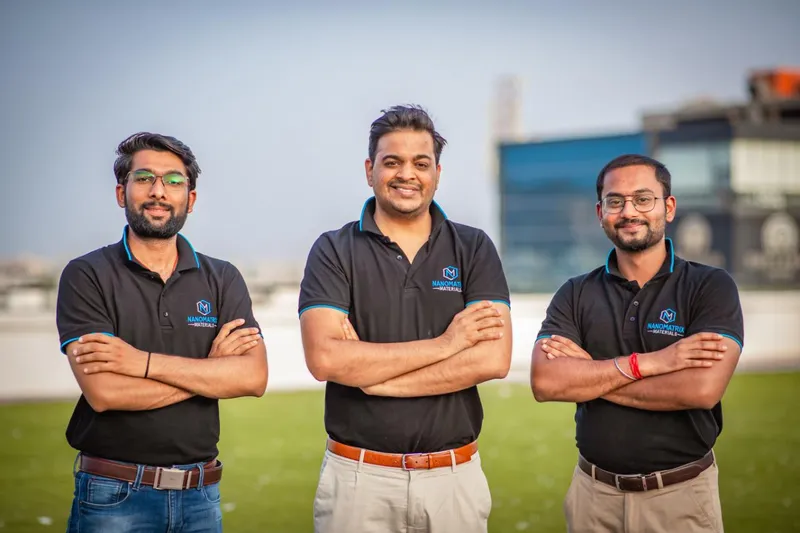These entrepreneurs took risks to climb the success ladder, and other top SMB stories of the week
This week, SMBStory covered inspiring stories of entrepreneurs who took risks and stepped out of their comfort zone to build successful businesses.
Every failure is a step towards success. Taking risks is not the only determinant to success, but it is an important influencer.
This week, SMBStory covered compelling stories of a 15-year-old failing business that was revamped to see success. It also covered the journey of a cosmetic brand that established itself in the market dominated by L'Oreal India, Lakme, Colorbar, Lotus, SUGAR, etc.
Amrutam

Stuti Gupta and Agnim Gupta
Founded in 2006, Amrutam is ayurvedic health and personal care brand that was running into losses until 2016. Its founder, Ashok Gupta, who was working as a distributor for various pharma companies was finding it hard to keep the business afloat until his children Agnim Gupta and Stuti Gupta decided to step in.
What restarted in August 2017 by getting one order a month has now grown to be receiving 4,000 orders per month, with a revenue of more than Rs 2 crore. The company also claims to have witnessed a 250 percent jump in revenue in FY 21.
Agnim and Stuti revamped Amrutam and rebranded its products. From supplying herbal medicines to medical stores and doctors, Amrutam started selling premium personal as well as healthcare OTC products online, through their website, and directly to the consumers (D2C). They also repackaged the products and labelled them differently.
The brand has around 1,000 SKUs, and Stuti claims it differentiates from its competitors in the healthcare category by offering ayurvedic malts.
Zilch Cosmetics

Zilch Cosmetics cofounders Mudra Mukesh (left) and Ananya Ukil (right)
For Ananya Ukil (35) and Mudra Mukesh (35), giving up the security of a salaried job and taking the entrepreneurial plunge was backed by their belief in building an online cosmetics brand and capitalising on the growing cosmetics market in India.
With established players, including L'Oreal India, Lakme, Colorbar, Lotus, etc., and younger ones such as SUGAR building online stores and expanding their product portfolios — Ananya and Mudra felt there was a problem of plenty.
“A 10-step skincare routine using multiple products can be hard to get behind. We felt that whatever your skincare needs, maybe two or three multifunctional products should be able to deliver the results you are looking for,” says Ananya.
The founders say the bootstrapped brand came to life on the back of their experience in the FMCG industry and consumer research and was borne of their personal challenges in finding “no-nonsense products that were easy to use.”
With this in mind, the duo started Zilch Cosmetics in Delhi in 2019 and launched their range of makeup, skincare, haircare, and body care products.
Other top picks of the week:
Nanomatrix Materials

Scouting for suitable opportunities, Vikas Bardiya found a gold mine in Africa in 2007. However, after exploring the space for a while, he realised that this was a large operation with huge investments involved. Nothing materialised in the immediate circumstances but Vikas continued to explore.
Around 2012, Vikas found a huge graphite deposition in Africa again. In this deposition, he found an opportunity. “Graphite alone has hundreds of applications including in segments such as lithium-ion batteries, clean energy and more.” Research helped him gather that the use of graphene had huge potential, and it was a burgeoning industry.
According to Vikas, he spent the time between 2017 and 2019 doing research, hiring scientists and consultants from around the world including Germany and the US, and started collecting resources to develop nanomaterials. He finally launched Nanomatrix Materials in February 2020 in Jaipur. The business has one unit in Jaipur, where it develops graphene.
Kylas

Vikram Kotnis, Ketan Sabnis, and Vinayak Katkar, Cofounders, Kylas
When Vikram Kotnis, Ketan Sabnis, and Vinayak Katkar started a digital marketing agency in 2010 in Pune to help small businesses adopt digital marketing solutions, one thing disturbed them: the inability of SMBs to tap technology.
While dealing with small and medium businesses to strategise marketing initiatives, they realised that the reasons they could not go in for a tech upgrade were varied, including lack of skills, budget, and a solution that could handhold them.
The trio knew that a solution was needed to put the small businesses on their path to growth. After over a decade, the trio launched Kylas, a new-age enterprise-grade and customisable SaaS product that is uniquely positioned to help small and medium businesses streamline their sales efforts, engage with customers effectively, and grow.
“SMBs in India have been severely impacted with the uncertainties of start-stop lockdowns, unreliable cash flows, and disrupted supply chains. The pandemic forced SMBs to accelerate digital adoption and ensure business continuity. We launched Kylas with a vision to make a high-quality CRM software accessible to small businesses with a differentiated pricing and no hidden costs to help them focus on reviving the business,” Ketan tells SMBStory.
Ketan adds that the primary aim of building Kylas is to let SMBs focus on reviving their businesses without the additional burden of an increase in technology costs.
Gunsberg

Gunsberg founders Sarthak Aggarwal & Abhishek Bajaj
Chandigarh-based entrepreneur Sarthak Aggarwal was sitting in front of a full-stack refrigerator in Singapore when he realised how limited the options are when it comes to cold beverages in India, especially homegrown brands.
In 2017, he started toying with the idea of having a ‘made in India, made for the world’ non-alcoholic ginger beverage, with his mother’s ginger ale recipe as the base.
“I had a misconception that making the beverage would be easy. I had no food background and needed someone who understands the same. This is where our co-founder Abhishek Bajaj, who runs a successful chain of sweet brands in Chandigarh, stepped in,” says Sarthak.
With an initial investment, the duo set up a production plant in Mohali and sold their first bottle under the brand name Gunsberg in 2019.
The childhood friends-turned-cofounders outsourced production for a few sample bottles to gain feedback and worked on the taste, longevity, and design of the product, before they perfected a batch. The brand claims to have hit break-even within six months of operations.
In terms of supply chain model, Gunsberg works both offline (retail stores, cafes and restaurants) and online (Amazon and Gunsberg website). It has amassed a network of 25 distributors, reaching around 2,000 outlets across 40-50 cities in north and east regions. The B2B and D2C brand also has an international presence across Nepal and Bhutan.
Edited by Megha Reddy








